When you're a parent, your child becomes your whole world. It's an inevitable instinct that your child’s overall health and well-being are your foremost priority. Recognizing that a significant portion of a child's learning, as much as 80%, occurs visually, ensuring their eye health is a natural and crucial extension of this commitment.
Regular pediatric eye exams are therefore vital for identifying and addressing any potential vision concerns early on, allowing your child to fully engage with the world and learn effectively.
Importance of pediatric eye care for children's vision development
Given that children learn and retain information primarily through observation, healthy vision plays a crucial role in their cognitive and social development. Undiagnosed vision issues can hinder their ability to participate in class, interact with friends, and ultimately impact their confidence.
At Rutnin Eye Hospital, we offer specialized eye care delivered by a compassionate and skilled team committed to the visual health of your child.
Why Pediatric Eye Exams Are Important
A pediatric eye exam, performed by a pediatric optometrist or pediatric ophthalmologist, provides a comprehensive assessment of your child’s eye health. This proactive approach allows for the early identification of any potential issues, empowering you as a parent to take timely steps to support your child's visual development and learning.
When Should Children Start Having Eye Exams?
It is recommended that kids have their first eye exam as early as 6-12 months of age. This is a critical period for visual development, allowing the early detection of conditions like lazy or crossed eyes before they become more challenging to treat.
What Happens During a Pediatric Eye Exam?
Taking your child for their first pediatric eye exam can feel overwhelming. However, it’s important to know that it is more comprehensive than a vision screening, aiming to diagnose any existing eye conditions.
On your first visit, you can expect to be asked about your child’s medical history, including any pre-existing health conditions, allergies, medications, and any family history of eye problems. This background helps the pediatric ophthalmologist understand any potential risk factors.
Here are some key tests included in a comprehensive pediatric eye exam:
- Visual acuity test: The visual acuity test determines how well your child can see the detail of a symbol from a distance, which assesses the clarity and sharpness of their vision.
- Refraction test: During this test, the doctor will briefly shine a light into your child's eyes to see how they're focusing. It's a safe and common procedure that helps doctors figure out if they might need glasses.
- Eye alignment and movement check: This test involves your child following an object with their eyes to observe eye alignment and how well they can maintain focus.
- Eye health evaluation: This is a thorough check of the different parts of your child's eyes, inside and out, to rule out any potential eye diseases.
Understanding Pediatric Eye Conditions
During your child's early developmental years, their eyes are still maturing, making them more susceptible to eye problems. Therefore, understanding pediatric eye conditions is crucial for parents to safeguard their child's healthy vision development.
Refractive Errors
Common issues like nearsightedness, farsightedness, and astigmatism are easily corrected with glasses.
Strabismus and Amblyopia
Misaligned eyes (strabismus) can lead to a lazy eye (amblyopia) if not treated, often requiring patching or other therapies.
Conjunctivitis
Inflammation or infection, known as pink eye, presents with redness and discharge and can be caused by viruses, bacteria, or allergies.
Other Conditions
Rarer but serious issues like pediatric cataracts, glaucoma, and retinopathy of prematurity require timely diagnosis and intervention.
Choosing the Right Pediatric Eye Doctor
Just like choosing any doctor, finding the right pediatric eye doctor – one you feel truly confident in – is essential for your child's vision care.
Specialization: Finding an ophthalmologist who has a deep understanding of the unique developmental stages of a child can make all the difference in the thoughtful and effective care they provide.
Board certification and credentials: Naturally, you want to feel confident in your child's eye doctor. One key way to build that trust is by checking their board certification and credentials. Board certification indicates that they have completed a recognized training program and have demonstrated competency in their specialty.
Rutnin Eye Hospital ensures that you have access to highly specialized ophthalmologists, advanced equipment, a collaborative medical environment, and high standards of patient care.
Preparing Your Child for Their First Eye Exam
Preparing your child for their first eye exam can make the experience more positive and less stressful for them. Simply bringing along a few familiar comforts, such as their favorite toy, blanket, or pacifier, can help them feel safe and at ease.
During the exam, the doctor will likely use techniques that don't require active participation from your baby, such as observing their gaze, testing their reflexes, and using special lights. Your calm and reassuring presence is the most important factor; holding them, talking softly, or offering a feed if needed can help them stay relaxed.
Bringing your child for their first eye exam is a wonderful way to protect their precious eyesight, laying a strong foundation for their future visual health and well-being. You are doing the right thing!
Book Your Appointment Today
Schedule your child’s first pediatric eye exam at Rutnin Eye Hospital today and make that first step towards a lifetime of healthy and clear vision. Our specialized ophthalmologists are dedicated to providing comprehensive and gentle eye care tailored to your child’s unique needs.
 02-056-3333
02-056-3333





